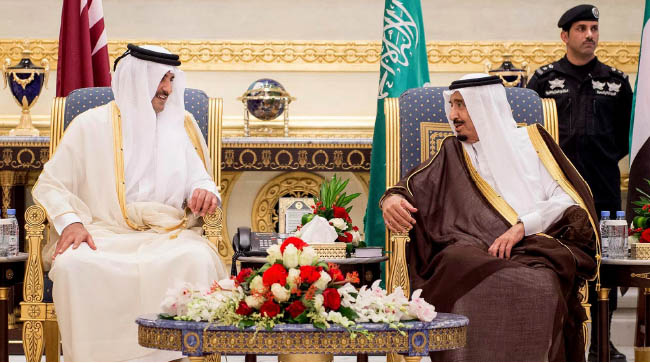After waving the white flag of the Taliban, which was called an insult to Afghanistan’s formal position, Qatar came to limelight in Afghanistan. But the United States appointed Qatar for inaugurating the Taliban’s political office, welcomed by Doha. Qatar had a prominent role in Islamic groups and the Middle East issue. Aljazeera state network was the only reporting media outlet for al-Qaeda and the Taliban as it broadcast the audio of Osama bin Laden and Zawahiri.
Despite Saudi Arabia, which was not inclined to involve in Afghanistan’ issue following the Arab Spring, Qatar emerged as a key player in the region and came under the attention of western countries. Qatari officials sought to fill the vacuum left by Saudi, which was beyond the tolerance of Riyadh. The situation turned in favor of Qatar and this country had great influence over the Islamic institutions, including al-Qaeda and the Taliban, mainly in Egypt, Palestine and Syria.
On the one hand, the US intended to use Doha’s leverage in holding negotiation with the Taliban, but on the other hand, Saudi showed tendency towards Pakistan with strong dislike of Doha. Riyadh persisted Kabul not to accept Qatar’s mediation as Afghan former President Hamid Karzai said to the Taliban that his administration was in favor of Saudi or Turkey to host the peace negotiation.
However, the Taliban denied Karzai’s demand stating that Afghanistan lacked the necessary qualification for talks and they would hold negotiation with the United States and the international community. With reports about inauguration of the Taliban’s office in Qatar, Afghanistan’s foreign ministry recalled its ambassador from Doha to Kabul as a sign of complaint. But later accepted Qatar’s role for hosting talks.
Qatar’s high ambition in regional and international issues paved the ground for a negative political competition between Riyadh and Doha.
Qatar occupies 180 square kilometers with about two million population. This country shares a strong tie with the US, England and some other western countries. It could extend its realm of influence in some Islamic countries and the Middle East. In short, Qatar’s role became more significant in the Middle East issue after 2010. The reason behind this fact was Qatar’s strong economy and the support of the US and the Europe.
Saudi had an eye on Qatar’s competitive role. A number of Middle Eastern and Western powers are believed to be inclined to use Qatar as Saudi’s rival.
Saudi-Qatar conflict continued mysteriously and took stronger root. These tensions came to a head during a March 2014 meeting of the GCC, after which the UAE, Saudi Arabia and Bahrain announced the recall of their ambassadors to Qatar.
With the new administration in Qatar, a military coup occurred in Egypt and some heads of Muslim Brotherhood (MB) took refuge to Qatar. Doha’s political support to Islamist movement continued for years. Saudi signaled a threat through recalling its ambassador but Qatar did not yield. With Kuwait’s mediation, the MB’s heads were supposed to head for Turkey rather than being sent to Egypt.
With the revival of the South Pars gas tanks, foundation of influential Aljazeera TV-network and financial support to some Islamic organizations, Qatar sought a strong base in Persian Gulf.
After the withdrawal of US military forces from Saudi Arabia, Qatar urged the US to establish its military base in this country. Hence, besides not being an ally with the world’s super power, Riyadh considered Doha a serious rival.
Saudi-Qatar proxy war continued over supporting the militant groups in Syria. Saudi constantly accused Qatar of supporting Jabhat al-Nusra and its support to Hamas is not an emerging issue. Despite all these differences, the two countries kept their relations during Obama’s administration. However, Saudi sought to review its role in the Gulf Cooperation Council (GCC), whereas Qatar struggled to follow a policy independent from Saudi and region. So, an agreement seems really hard now.
The current regional evolution, mainly the US, appears promising for Saudi, since it deems Donald Trump closer to Saudi than Obama. In his trip to Saudi, Trump was welcomed beyond his expectation and received precious gifts. After returning to America, Trump said in the White House that it was time for Qatar to end supporting terrorism.
Now Qatar’s tie has been severed with Saudi, Emirate, Bahrain, Egypt, Libya, and Yemen. The main problem for Qatar, which is the major exporter of gas and petrochemical products, is importing goods.
Turkey and Iran seek a new polarization out of the emerging issue in the Middle East and Islamic countries. Iran has begun exporting goods to Qatar by air and sea. Turkish products also filled Qatar’s store shelves.
Currently, Afghanistan has no relation with Qatar politically or economically and the only issue is the Taliban’s political office in that country. Based on the current occurrence, neither the US will pay heed to Taliban’s political office in Qatar nor will Doha continue the issue as before. So, one will conclude that Afghanistan will stand beside Saudi rather than Qatar.
Home » Opinion » Saudi-Qatar Encounter on a Rough Road
Saudi-Qatar Encounter on a Rough Road
| Syed Asif Husaini

